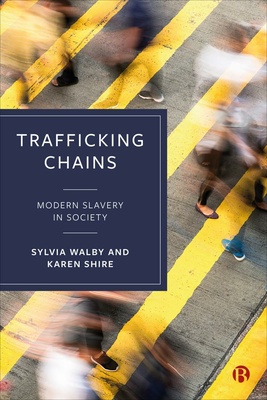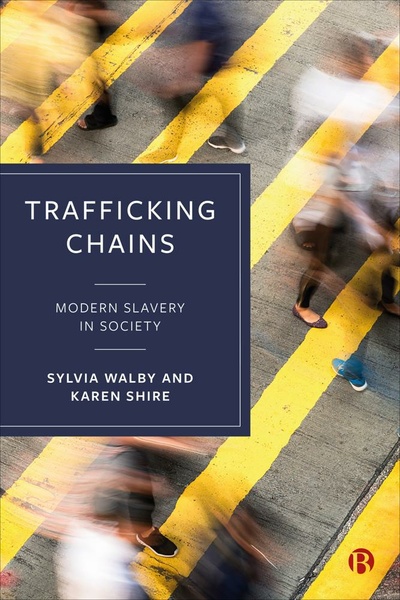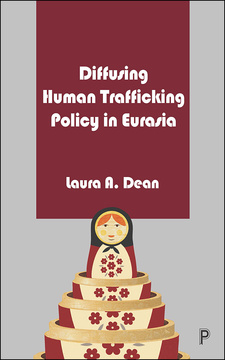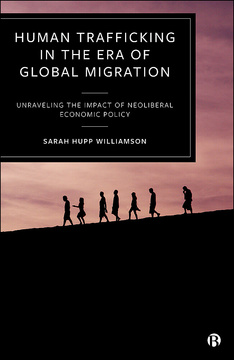Published
Apr 22, 2024Page count
214 pagesISBN
978-1529232356Dimensions
234 x 156 mmImprint
Bristol University PressPublished
Apr 22, 2024Page count
214 pagesISBN
978-1529232363Dimensions
234 x 156 mmImprint
Bristol University PressIn the media
'PODCAST: Modern slavery in society' on Transforming Society
Available open access digitally under CC-BY-NC-ND license.
This book offers a theory of trafficking and modern slavery with implications for policy. Despite economic development, modern slavery persists all around the world. The issue is not only one of crime but the regulation of the economy, better welfare, and social protections.
Going beyond polarized debates on the sex trade, an original empirical analysis shows the importance of profit-taking. Although individual experience matters, the root causes lie in intersecting regimes of inequality of gender regimes, capitalism, and the legacies of colonialism. This book shows the importance of coercion and the societal complexities that perpetuate modern slavery.
"This important book significantly broadens our understanding of trafficking/modern slavery, pushing the boundaries of existing knowledge. Through the lens of a macro theory of society, it meticulously constructs a comprehensive and interdisciplinary framework that illuminates the underlying causes of the problem, stemming from capitalism, coloniality and gender inequalities. Understanding trafficking as a phenomenon occurring across economy, politics, violence and civil society, the book unravels how trafficking differently manifests and evolves in the variety of existing regimes, whether neoliberal, social democratic or authoritarian. Its holistic and multidisciplinary approach is indispensable for grappling with the intricate complexities of the problem and charting pathways towards meaningful solutions." Emanuela Lombardo, Madrid Complutense University
"Unmasking a shocking worldwide reality, Walby and Shire paint a striking picture of the coercive system of human exploitation and abuse. Based on an impressive blend of practice and theory, Trafficking Chains is compelling, crucial, and comprehensive for not just grasping a 'wicked' problem that threatens individual autonomy, safety and justice across the globe, but also for considering the complex pathways to its eradication." Amy G. Mazur, Washington State University
"Trafficking Chains takes an excellent multidisciplinary and interdisciplinary approach to the complexities of the nexus between coercion, trafficking/modern slavery and violence. The authors engage with questions regarding the nature of freedom, agency, choice, consent and intention in the context of the sex trade. Further, they offer searing/nuanced insights into the nature of the social systems and gender regimes within contemporary forms of capitalism, legacies of empire and coloniality within borders, migration and ethnicity, and global processes. This book issues a call to action, highlighting the need to interrogate debates about abolition or empowerment in the sex trade by mobilising analyses of selling, buying and profit-taking therein and by examining the different bodies of the law—civil and criminal—that attempt to regulate coercion out of the sex trade. It also illuminates the urgent need to determine the root causes of trafficking/modern slavery in institutions and social systems in order to successfully prevent these crimes from continuing to occur. The authors argue that the very existence of trafficking/modern slavery challenges traditional, linear notions of modernity and progress and, therefore, that criminal prosecution requires identifying appropriate points of prosecution along the trafficking chain combined with transnational action on enforcement. With its trenchant insights and clear, accessible style, this publication is important reading for anyone who works in the fields of development, criminal justice, human rights, gender, migration, or labour research." Aisha K. Gill CBE, Centre for Gender and Violence Research, University of Bristol
"This comprehensive survey of trafficking/modern slavery pulls no punches in how global and gender inequalities subject women and child migrants to sexual and economic harms. Walby and Shire offer a multiprong economic, legal, and policy approach to coerced labor, forced marriage, and exploitation of the bodies of others. Through the concept of trafficking chains and attention to profit taking, they develop a new interdisciplinary field that matters." Eileen Boris, University of California, Santa Barbara
"In applying gender regime theorizing to trafficking/human slavery and introducing the concept of the “trafficking chain”, Walby and Shire elucidate the complex dimensions of a disturbing but persistent global phenomenon that affects vulnerable populations, especially women and girls, across world-regions. This is feminist sociological research at its finest.” Valentine M. Moghadam, Northeastern University
"The urgent lesson contained in these pages is that any steps towards ending modern slavery and trafficking need to be grounded in a systemic understanding of how exploitation operates and vulnerabilities are constructed within multiple varieties of modernity. This book offers a sophisticated analysis of the operation of trafficking at the intersection of regimes of inequality derived from capitalism, coloniality and gender, and challenges siloed single-discipline approaches to consider violence and harm within multiple and interconnected domains of economy, polity and civil society. Ultimately, it makes a case for how an interdisciplinary and systemic thinking can underpin comprehensive policy approaches to eradicate violence and harm, as investigated in relation to sexual exploitation. Trafficking Chains argues for no less than a transformation of how the problem is understood and solutions deployed." Sundari Anitha, University of Sheffield
"How can we understand the complexities of trafficking? What can be done to stop modern slavery existing? The problems of trafficking and modern slavery are extensive, global and multi-dimensional. Here, Walby and Shire cut through the dizzying array of issues involved with lucid precision, contextualising the topic and bringing together an array of interdisciplinary tools to chart clear routes of comprehension. Dissecting controversies, sifting data and developing new concepts – notably the ‘trafficking chains’ of its title – this authoritative and wide-ranging book develops a new interdisciplinary field and will be immensely useful for both academic and public debate." Jo Littler, Goldsmiths, University of London
"Combining theory, policy and practice, this book compels us to consider the complexities that contribute to trafficking/ modern day slavery. Drawing on a multidisciplinary, interdisciplinary approach, and in developing the notion of trafficking chains, Walby and Shire, systematically show the causes, prevalence and persistence of violence/coercion and gender and inequality globally. Also analyzed are the deep ties to colonialism and capitalism. Importantly, this book not only problematizes but also offers some possible solutions. A must read for those for those interested in the fields of criminal justice, migration, gender inequality, violence and society." Margaret Abraham, Hafstra University
"A clearly argued text which uses social theory in an innovative way to both understand this complex global phenomenon, whilst also providing a comprehensive contribution to the development of policy and legal regulation. Essential reading for students, teachers, practitioners and researchers." Social Policy & Administration
"This well-argued and well-referenced work makes an important contribution to the debates on the laws, data, and policies required to end modern slavery." CHOICE
Sylvia Walby OBE is Professor of Criminology at Royal Holloway, University of London. She is Fellow of the British Academy, Fellow the UK Academy of Arts and Social Sciences, and Co-President of International Sociological Association’s TG11 on Violence and Society.
Karen A. Shire is Professor of Comparative Sociology at the University of Duisburg-Essen, Germany. She is a Member of the International Max-Planck Research School on the Social and Political Constitution of the Economy, and President of International Sociological Association RC02 Economy and Society.
1. Introduction
2. Theory
3. Law
4. Data
5. Policy
6. Sexual Exploitation
7. Conclusion














